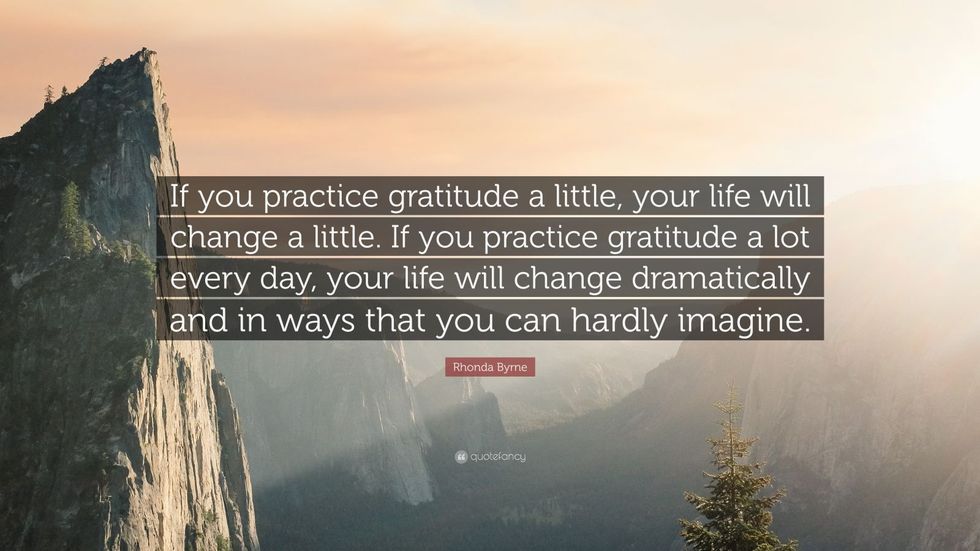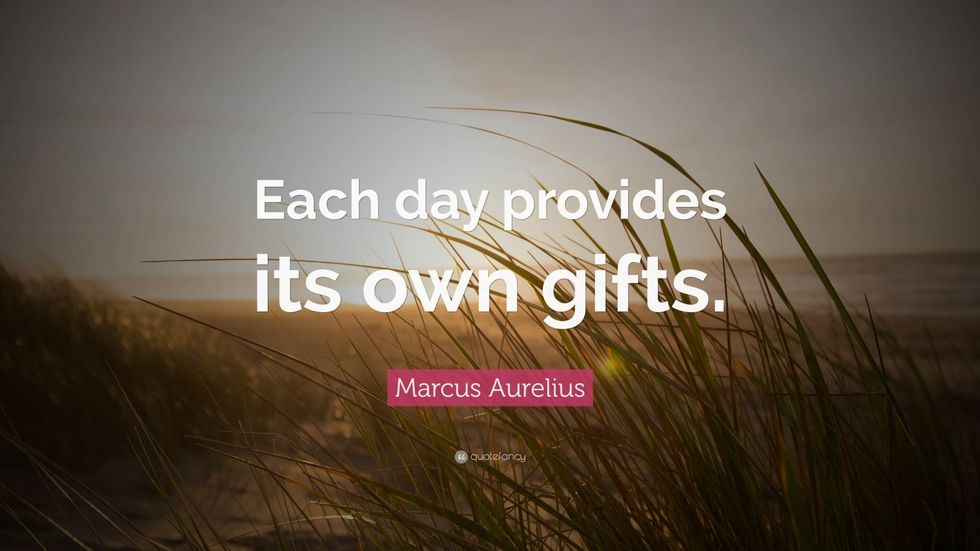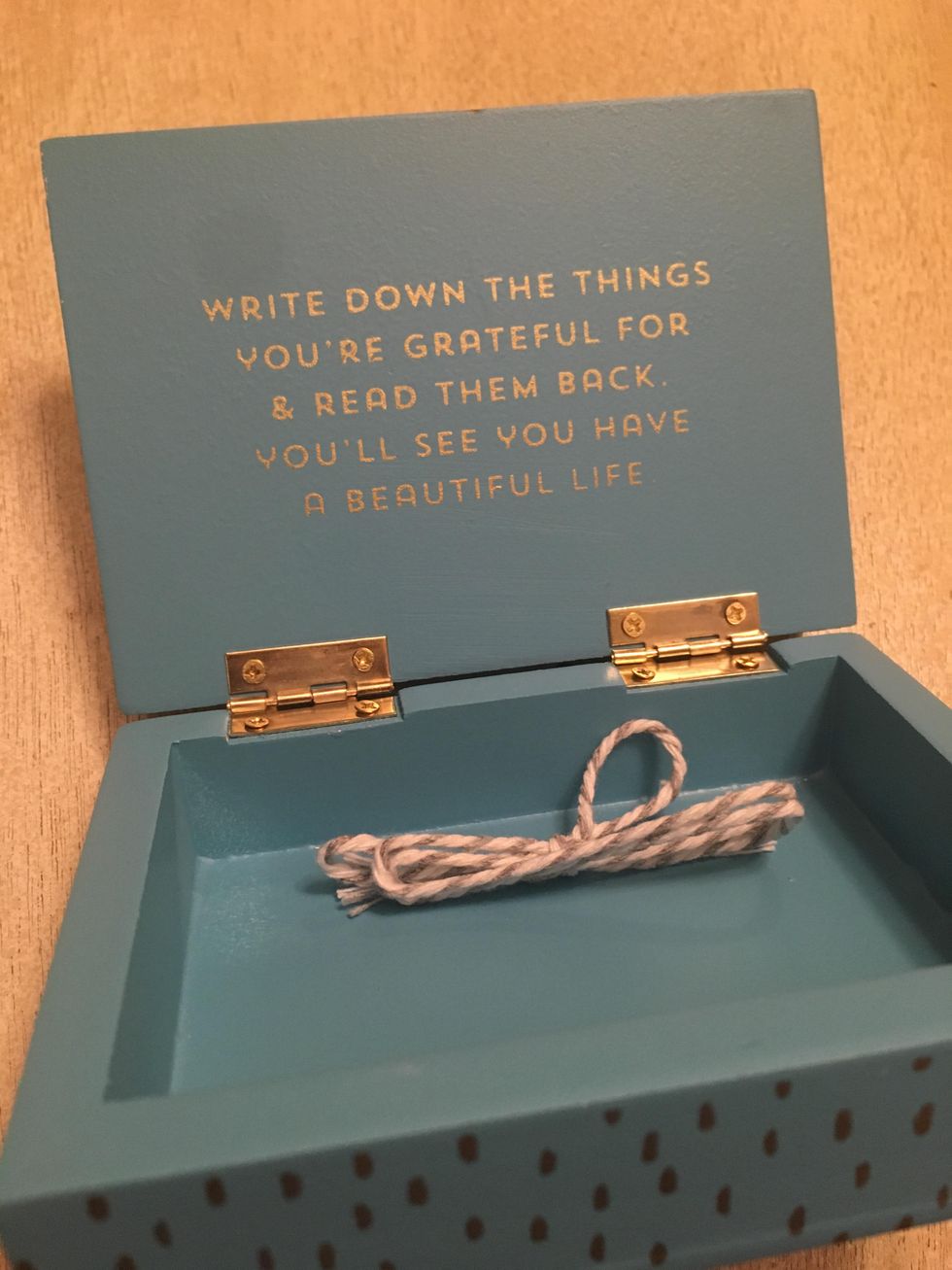Last year was a rough year for me. It was the end of my junior year and
beginning of my senior year at university; I was doing way too much and
not spending nearly enough time prioritizing my own self-care --
and my body had enough. I started having panic attacks, getting very
physically anxious to the point that I had trouble getting out of bed at
all or leaving the house. I didn't pass any of my classes in the spring
semester. So, I spent the summer and fall taking some major steps back
and building up the habits, practices, and support systems I knew I
would need to get to where I wanted to be. I'm sure I'll write plenty
about the things I learned in this time, what I decided to build into my
life, and how I did it, but here I'd like to focus narrowly on one of
the smallest, easiest, most seemingly frivolous but deeply rewarding
practices I've cultivated: gratitude.
Gratitude is not the same thing as thankfulness. To be thankful, all you really have to do is say "thank you" -- which is an important and valuable facet of putting gratitude into action -- but I like to think of gratitude more as a state of mind. Being grateful, to me, is not a reactive state, but a proactive one; it's not just about appreciating it when something good happens to you, it's about developing the skills to see and appreciate all the good around you and within you all the time. And like any skill or state of mind, gratitude is a result of attention, intention, prioritization, and consistency. The word "practice" is really just the perfect way to sum it up -- it's not just a habit you pick up by accident or something you do once in a while, but a piece of your life that you dedicate time and effort to daily because you care about and believe in the results you know you'll get.
So, what are these results? Why am I talking about this, and what do I mean by a gratitude practice? In the next five weeks, I'm going to give you five basic ways that practicing gratitude has had an impact on my life and helped me to work through the things I struggle with. Within each article, I'll give you some examples of easy, specific things that I or people I know do to practice gratitude. I'll conclude with some tips for creating your own healthy, realistic, and sustainable gratitude practice.
Why I Love My Gratitude Practice:
1. It helps me maintain a positive attitude in the face of disappointment, frustration, and pain. Not every day is a good day, but there are good things in every day!
Here's the truth: life can be really hard. Sometimes things are just not fair, people do shitty things, you fail at something you care about, or you hurt yourself or others. This stuff is real and the feelings you have about it are valid; it does no good to pretend they aren't or to slap a happy face on instead of taking steps to acknowledge them. Having a positive attitude that fosters resilience in life isn't about avoiding the bad -- it's about seeing that it exist alongside the good. I am a super positive person, and always have been, but when someone asks be how my day is, I answer honestly: "Today's actually been pretty hard. I'm struggling with x. Thank you for asking, though. It's good to remember that on crappy days there are still good people who care."
As a part of her gratitude practice, my best friend Emily started an awesome little tradition with her best friends from high school that gets directly at this idea. They call it "Three Things": every night before they go to bed they text their group chat three good things that happened that day. Sometimes it's big, important, super exciting things like "I got that internship I really wanted!" but it can also be small things like "I took a break from homework to get coffee with a friend I haven't seen in a while, and it was so nice." A lot of the time it's pretty easy to think of at least three little bits of positivity, and doing so right before bed is so good for you -- it helps you settle into a relaxed state so you aren't as anxious going to sleep. But the thing I think is most special about any daily gratitude practice like this is the effect it has on those days that are so awful it's difficult to think of a single positive thing at all. On days like that, these friends might prompt each other with questions: "Did you eat anything yummy?" "Did you get to see that friend you love in your psych class?" "How's your dog doing? Did he play in the snow?" These are the days when this practice is most important, because no matter how down you are and how many real and important disappointments a bad day holds, you can and will always find at least three good things that existed in that day. Even if it's, "I had a horrible migraine and couldn't do anything, but I texted my sister about it, so she came into my room with snacks and tea."
If we only think in terms of "good day/bad day," "good person/bad person," or "good feelings/bad feelings," we deny ourselves the joy or our own complexity. Nobody deserves pain, but we can choose to grow through it -- and that's beautiful! You're allowed to have days where a lot of the world upsets you, but if you can practice the skills of looking for the blessings, and spend some time really feeling them, especially on those days, you'll find yourself better able to weather all life's little storms.
Tips for Creating Your Own Gratitude Practice:
1. Write it down!
Emily types it out in text messages to her friends -- I keep a gratitude journal! I have a tiny little black notebook that I keep next to my bed, and every night before going to sleep, I write my three things in that journal. I also have other versions of this that I don't do daily but that I do every time I'm in certain places or with certain people: anytime I go to a coffee shop, whether to study on my own or catch up with a friend, the first thing I do when I sit down is pull out my journal and write down "Ten Things to be Happy About." This is an especially fun one, because other people can do it with you. After you've each written your ten, you take turns reading them aloud to each other, one at a time. It's impossible not to smile, and usually there are some things in common on both lists -- as well as things on another person's list that you would've never considered. So fun! I know some people who write things on little slips of paper and put them in a box or a jar that they've decorated. Some people write them on a dry erase board above their workspace at the beginning of each day. Whatever it is, just make it your practice, and make sure you write it down!
There's so much value to writing things out. You have to focus on it long enough to actually put it into words. You get to see it physically in front of you -- it takes up space in the real world, rather that just existing as a passing thought in your mind. And you can return to it later! On bad days, I'll sometimes just take a few minutes to flip through my gratitude journal and reread all the little things that have made my days bright. You'll also start to notice patterns faster -- so a lot of your gratitudes have to do with music, but you haven't been listening to any or gone to see any live lately? Boom -- great self-care idea! Is there a particular person who's been popping up in your journal a lot? You should tell them so -- odds are, expressing that gratitude to them too will bring you both even more benefits and help you grow closer.
Ok, well that's the first installment for you! I'll share another reason I love my gratitude practice and another tip for creating your own next week. Just go ahead and give it a try-- it's so easy! Challenge yourself to practice gratitude intentionally this week by writing it down, and let me know how it goes. If you know me, you know that I love language, so I'll take the opportunity to end with a quote:
"When we focus on our gratitude, the tide of disappointment goes out and the tide of love rushes in." -- Kristin Armstrong










 The minimum wage is not a living wage.
StableDiffusion
The minimum wage is not a living wage.
StableDiffusion
 influential nations
StableDiffusion
influential nations
StableDiffusion












